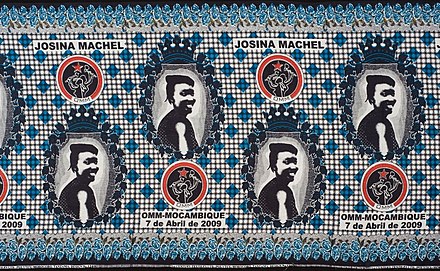Josina Mutemba Machel was a revolutionary Mozambican fighter for FRELIMO who, like thousands of women, fought for independence for her country until she died at the age of 25. She was born Josina Abiathar Muthemba on August 10, 1945, in the southern province of Inhambane. Unusually for an African woman of that time, her family encouraged her to attend school. In 1956, she moved to the capital, then called Lourenco Marques, to attend a secondary technical school.
There, Machel became politically active in clandestine student groups and joined an underground cell of the Mozambique Liberation Front, better known by its Portuguese acronym, FRELIMO. The dominant political organization in Mozambique today, FRELIMO, was founded in Tanzania in 1962 to fight for Mozambique’s independence from Portuguese rule.
When she was 18 years old, Josina Machel fled Mozambique to join the war of liberation against the Portuguese. In her first attempt to fight the Portuguese, she was captured in what was then Southern Rhodesia (now Zimbabwe), sent back home, and imprisoned for several months. In her second attempt, she managed to reach the Frelimo headquarters in Tanzania’s capital, Dar es Salaam —a journey of 3,500 kilometers (2,175 miles).
When she reached her 20th birthday, Josina was immediately assigned tasks as part of FRELIMO’s multifaceted quest for national independence. She began her work at the Mozambique Institute, an educational center for Mozambican students in Tanzania, as assistant to the director. The director was Janet Mondlane, the American-born wife of FRELIMO President Eduardo Mondlane. A year and a half later, Josina turned down the offer of a scholarship to study at a college in Switzerland and volunteered to work instead in FRELIMO’s newly formed Women’s Department (Destacamento Feminino). The Women’s Department’s mission was to provide women with political and military training so that they could be fully integrated into the liberation struggle.
Josina was appointed head of the Women’s Department in FRELIMO’s International Relations Division at the age of 24. In this capacity, she was required to travel abroad to international conferences on women’s rights and report firsthand on the experiences and realities of Mozambican women and people. She consistently advocated for women’s equal participation in political, economic, and social life. The year 1969 was an eventful one in her life, for in May 1969, she married Samora Machel in southern Tanzania. Machel was the major military leader in FRELIMO and a future President of independent Mozambique. In November of the same year, they had a son whom they named Samito.
In 1969, Josina Machel was appointed head of the FRELIMO Department of Social Affairs and continued to develop care and education centers for children in the northern part of the country. She encouraged girls to attend school, which was one of the resolutions of the Second Congress. Despite the birth of her child, the indefatigable Josina almost immediately resumed her work in Niassa and Cabo Delgado provinces while her son was cared for in Dar es Salaam. In the meantime, her health rapidly deteriorated.
On April 5, 1971, she was taken to Muhimbili Hospital in Dar es Salaam, Tanzania, where she died two days later at the age of 25. Josina Machel’s legacy is recognized each year on the anniversary of her death when Mozambique celebrates its National Women’s Day to honor her commitment to equality.

